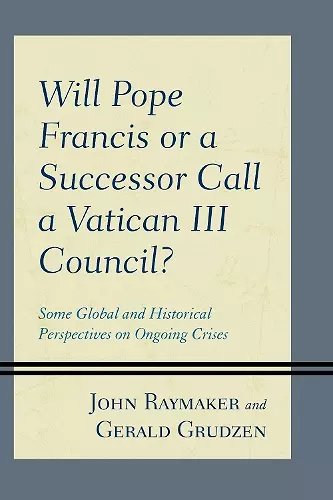Will Pope Francis or a Successor Call a Vatican III Council?
Some Global and Historical Perspectives on Ongoing Crises
Gerald Grudzen author John Raymaker author
Format:Paperback
Publisher:University Press of America
Published:30th Jun '20
Currently unavailable, and unfortunately no date known when it will be back

In 2008, the authors wrote Steps toward Vatican III which explored developments occurring in the Catholic Church including its teachings on social justice, interreligious dialogue, and Small Christian Communities. This update of Steps explores how Pope Francis has developed such themes in original ways in his encyclicals and in his use of synodal consultations. For example, in his Encyclical Laudato Si, the pope seeks to lead us into the mysteries of the universe, of creatures, and the harmony of creation. It helps us reflect on the universal communion of nature. Calling for a global ecological policy and a cooperative approach, the pope warns us that unless we respect nature, the entire planet and humanity will face drastic consequences.
In his meetings with economists and entrepreneurs, the pope has proposed a pact for renewing the economy to counteract the asocial aspects of modern business practices. He has discussed some of the most complex problems in today's world--from safeguarding the environment to courageously committing oneself to rethink the economic paradigms of our time. Young people, in particular, have responded with enthusiasm to Pope Francis’ initiatives. The book notes how some "traditional" Catholics have opposed the pope, but it argues that, in fact, the pope is more traditional than his critics for he insists on going back to Jesus' own teachings.
The new ongoing crises such as the breakdown and rise of new ideologies, terrorism, massive advances in the sciences and in technology, as well as fundamental shifts in gender relations are further factors considered in the book. Indeed, the world is now radically different from the world of the early 1960’s when Vatican II Council was held. Due to these many radical changes, the book suggests the need for a Vatican III which would consolidate the Church’s global outreach on every continent.
Over sixty years since the close of the Second Vatican Council, it has become ever clearer that the church has arrived at a new moment in her history, what Pope Francis has called “a change of epoch.” Climate change, pandemics, migration, economic and cultural globalization, the growing political power of women, the breakdown and rise of new ideologies, massive advances in the sciences and in technology, and fundamental shifts in gender gestalts are just a few of the factors that mark a world radically different from the world of the early 1960s. Within the church, questions about the role of the laity and forms of ministry continue to emerge, even as there has been a growing realization of the opportunities and challenges of deeply encountering other religions and spiritualities. The authors ask whether a new ecumenical council can help the church address the complex set of realities within which the church stands so as more effectively to promote the Gospel and Christian life. Grounded in their years of hands-on pastoral experience and a lived understanding of the global church, Grudzen and Raymaker propose a theologically-grounded rationale for a new council and sketch a hope-filled vision of the church of the future.
-- Paul Crowley S.J., Santa Clara UniverISBN: 9780761872252
Dimensions: 222mm x 153mm x 17mm
Weight: 340g
226 pages